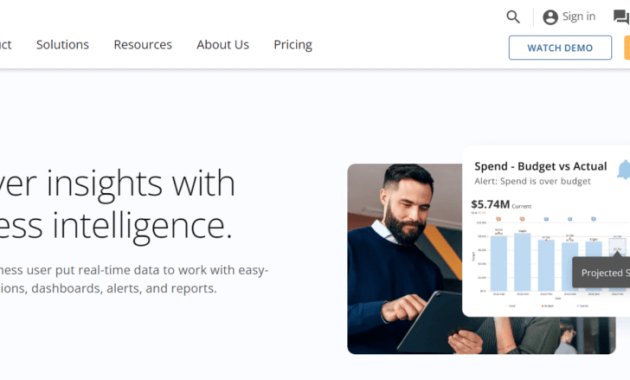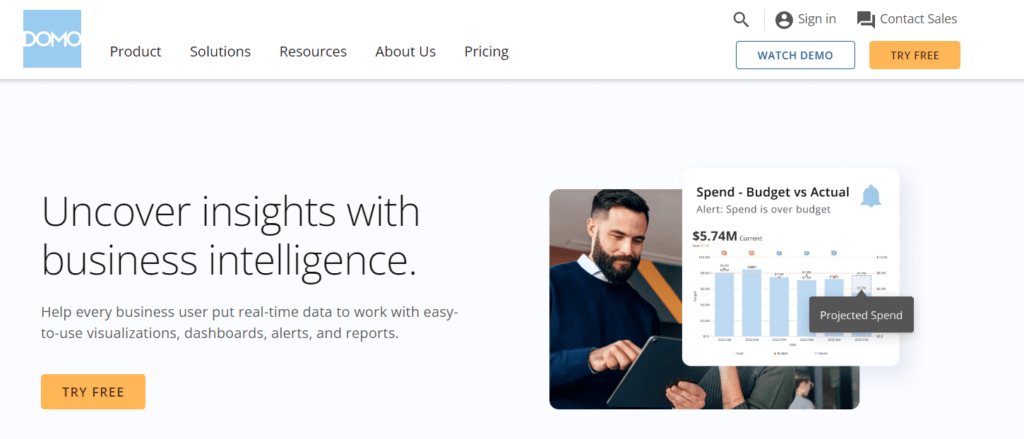
Boost ROI with Business Intelligence Software for Small Teams
In today’s fast-paced business environment, small teams face immense pressure to make data-driven decisions. The ability to analyze data effectively can significantly impact profitability and growth. For small teams, business intelligence (BI) software offers a powerful solution. It empowers them to understand their performance, identify opportunities, and optimize their strategies. This article explores how small teams can leverage business intelligence software to boost their return on investment (ROI).
Understanding the Power of Business Intelligence
Business intelligence software transforms raw data into actionable insights. It allows teams to collect, analyze, and visualize data from various sources. These sources include sales, marketing, finance, and operations. By understanding this data, teams can make informed decisions, improve efficiency, and increase their ROI. BI tools provide dashboards, reports, and analytics to help teams monitor key performance indicators (KPIs).
Identifying the Right BI Software for Your Team
Choosing the right BI software is crucial for small teams. The software must align with their specific needs, budget, and technical capabilities. Consider the following factors when selecting a BI solution:
- Ease of Use: The software should be user-friendly. It should not require extensive technical expertise.
- Scalability: The software should be able to grow with the team. It should accommodate increasing data volumes and user needs.
- Integration Capabilities: The software should integrate with existing systems and data sources. These systems include CRM, ERP, and marketing automation platforms.
- Pricing: The software should fit within the team’s budget. Consider both the upfront and ongoing costs.
- Features: The software should offer the necessary features. These features include data visualization, reporting, and analytics.
Popular BI software options for small teams include:
- Tableau: Known for its powerful data visualization capabilities.
- Power BI: Offers a comprehensive set of features at a competitive price.
- Zoho Analytics: An affordable and user-friendly option.
- Qlik Sense: Provides advanced analytics and data discovery features.
Implementing BI Software: A Step-by-Step Guide
Implementing BI software successfully requires a well-defined strategy. Follow these steps to ensure a smooth implementation:
- Define Your Goals: Clearly identify the business objectives. Determine what you want to achieve with the BI software.
- Assess Your Data Sources: Identify all relevant data sources. These sources can be databases, spreadsheets, and cloud applications.
- Choose Your Software: Select the BI software that best meets your needs. Consider the factors discussed earlier.
- Prepare Your Data: Clean and organize your data. Ensure it is accurate and consistent.
- Connect Your Data Sources: Connect the BI software to your data sources. Configure the connections to import data.
- Build Dashboards and Reports: Create dashboards and reports to track key performance indicators (KPIs). Visualize your data effectively.
- Train Your Team: Provide training to your team members. Ensure they understand how to use the software.
- Monitor and Analyze: Regularly monitor your data and analyze the results. Identify areas for improvement.
Boosting ROI with Data-Driven Insights
Business intelligence software empowers small teams to make data-driven decisions. This leads to improved ROI. Here’s how BI software helps:
- Improved Decision-Making: BI software provides real-time data and insights. This enables teams to make faster and more informed decisions.
- Enhanced Efficiency: BI software automates data analysis and reporting. This frees up time for team members to focus on other tasks.
- Cost Reduction: By identifying inefficiencies and optimizing processes, BI software helps reduce costs.
- Increased Revenue: BI software helps identify new opportunities. It helps teams improve their sales and marketing efforts.
- Better Customer Understanding: BI software provides insights into customer behavior. This helps teams improve customer satisfaction.
For example, a small marketing team can use BI software to track website traffic and conversion rates. They can identify which marketing campaigns are most effective. They can then allocate their budget accordingly, improving their ROI.
Real-World Examples of ROI Enhancement
Several small businesses have successfully used business intelligence software to boost their ROI. Here are a few examples:
- Retail Business: A small retail business used BI software to analyze sales data. They identified their best-selling products and peak sales times. They optimized their inventory and staffing levels. This resulted in a 15% increase in revenue.
- E-commerce Company: An e-commerce company used BI software to track customer behavior. They identified the most effective marketing channels. They personalized their marketing messages. This led to a 20% increase in conversion rates.
- Consulting Firm: A consulting firm used BI software to analyze project data. They identified areas where they could improve efficiency. They optimized their project management processes. This resulted in a 10% reduction in project costs.
Overcoming Challenges in BI Implementation
Implementing BI software can present challenges. Small teams must be prepared to address these challenges:
- Data Quality: Ensure the accuracy and consistency of your data. Data quality is critical for reliable insights.
- Data Security: Implement robust security measures to protect sensitive data. Comply with relevant data privacy regulations.
- User Adoption: Provide adequate training and support to ensure user adoption. Encourage team members to use the software.
- Integration Complexity: Integrate the BI software with existing systems. This can be complex, especially for legacy systems.
- Lack of Expertise: Consider hiring a consultant or training your team. This helps with the implementation and use of the software.
Maximizing the Benefits of Business Intelligence Software
To maximize the benefits of business intelligence software, small teams should:
- Start Small: Begin with a pilot project. Focus on a specific business problem.
- Focus on Key Metrics: Identify the most important KPIs. Track them regularly.
- Iterate and Improve: Continuously evaluate and refine your BI implementation. Adapt to changing business needs.
- Foster a Data-Driven Culture: Encourage data-driven decision-making. Promote the use of data throughout the team.
- Seek External Expertise: Consider consulting with a BI expert. This can provide valuable guidance and support.
Business intelligence software is a valuable tool. It helps small teams to boost their ROI. By following these steps, small teams can leverage BI software to achieve their business goals. They can make data-driven decisions. They can improve efficiency. They can increase profitability. The software provides the insights needed to thrive in a competitive market. The focus on data analysis empowers teams to optimize operations. The ability to track key metrics allows for continuous improvement. The insights gained help in making strategic decisions. This ultimately leads to better outcomes. The correct implementation of business intelligence software can be transformative. It can help small teams achieve significant improvements in their ROI. The benefits of business intelligence software are clear. Small teams should embrace this technology. They can unlock their full potential and achieve sustainable growth. To boost ROI with business intelligence software for small teams, start today.
The implementation of business intelligence software is an investment. The investment promises significant returns. The ability to analyze data empowers teams. This is crucial for success. The use of BI software is a strategic advantage. It allows for data-driven decision-making. It improves overall performance. It is essential to understand the benefits. It is essential to implement the software correctly. This is how small teams can boost their ROI.
Business intelligence software is not just a trend. It is a necessity for small teams. It helps them to stay competitive. It drives their business forward. It allows for informed decision-making. It ensures that resources are used efficiently. It maximizes the chances of success. The benefits are clear for small teams. They can leverage the power of data. They can achieve their goals. The key is to choose the right software. The key is to implement it effectively. The key is to foster a data-driven culture. Then, the ROI will follow.
In conclusion, business intelligence software is a vital tool. It allows small teams to boost their ROI. It enables them to make informed decisions. It improves efficiency. It drives profitability. The implementation requires careful planning. It requires a strategic approach. It is an investment that yields significant returns. Small teams should adopt this technology. They should unlock their full potential. They should achieve sustainable growth. This is the path to success in today’s business landscape. Business intelligence software is the key. The key to a data-driven future. The key to boosting ROI.
[See also: Related Article Titles]

